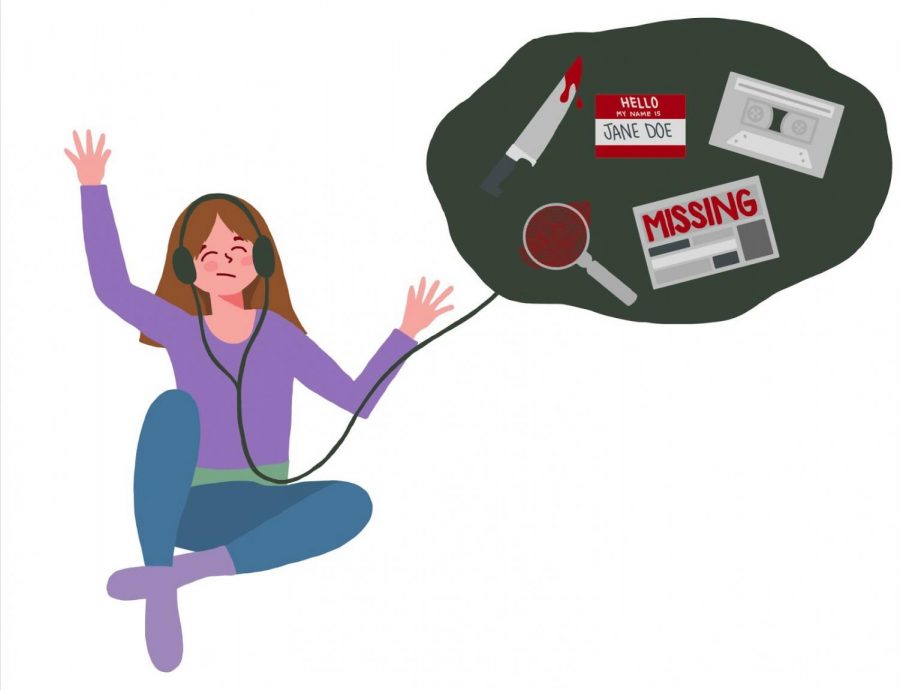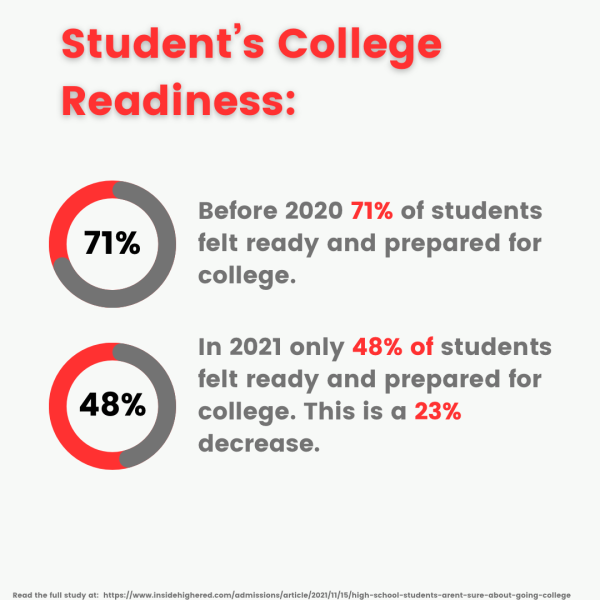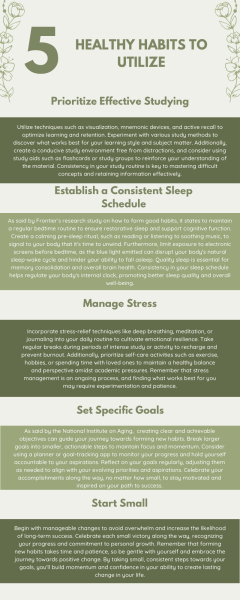Why is true crime so popular?
Art by Brigette Ramirez
From the numerous movies and television shows to podcasts and YouTube series, true crime has quickly become one of the most popular entertainment genres. But why has this genre, highlighting true and gruesome crimes, become so popular as of late?
Senior and true crime fan Ruby Mejia explains that her interest in true crime comes from its similarity to the horror genre.
“I feel like it gives you a thrill, kind of like a horror film,” Mejia said. “You get that excitement which at the same time scares you because you don’t know what’s lurking; you get that fear sense.”
Mejia accesses true crime through television and YouTube, where she watches documentaries and YouTubers talking about true crime cases.
One such YouTuber, Bailey Sarian, has amassed 5.8 million subscribers and millions of views on each of her videos. In these videos, she discusses true crime cases and “dark history” as she applies her makeup for the day.
But the reason behind the genre’s recent success may not lie in the genre itself, but in societal changes.
According to NBC News, Americans have long loved true crime stories, but the fascination was generally more of a guilty pleasure and not something discussed openly. In the last year, however, there has been a dramatic increase in the popularity of the genre, as evidenced by the national Netflix and podcast popularity rankings, which could, in part, be a result of increased screen time during quarantine.
Right as Rain, a digital publication by the University of Washington, explains that two of the most compelling factors of true crime are the storytelling and catharsis.
“True crime has all the basics of good storytelling: Interesting characters, a sense of urgency, tension that is [in most cases] released when the mystery is solved at the end,” McKenna Princing writes for Right as Rain. “The genre also has another selling point: catharsis. Normally, we experience emotions like sadness or anger in real-world situations that are much more serious and negatively impact us. Engaging with those emotions in a safe, contained and chosen environment — like on your couch — can be therapeutic for some people.”
Therapeutic may seem an odd way to describe reading, watching, or listening to stories of true, violent acts, but F. Diane Barth, a psychotherapist, mirrors Princing in her article for NBC News.
“A pervasive sense of helplessness, which many people have felt — some for years, some only for the past few months — can be modified or even lifted by seeing someone else speak about their pain and have it recognized,” Barth writes.
James Reynolds, the forensics teacher at the school, cites true crime as one of the reasons he became interested in teaching the class and argues that part of its appeal is that, at its core, true crime is an extension of the classical trope of a hero beating a villain.
“It’s just the evolution of police shows now and adding the technology to it,” Reynolds said. “It’s still chasing down the bad guys. It’s been around forever, but now, since [around] 1995, we have DNA evidence instead of just fingerprints being the best. Now, you can get partial DNA analysis with ancestry.com and 23andMe, so more of the public is understanding DNA and how much information it stores. I think the public is … catching up with some of the general science, and they make a splashy show on television. The [appeal is the] technology and chasing down bad guys and solving the mystery in one hour.”
But what effect can this continued intake of true crime media have on a person’s mental health?
Most concerns from psychological health professionals surrounding true crime are about the genre extending myths and victim-blaming in relation to the violent and rare crimes it tends to highlight.
In her article, Princing makes it a point to remind readers that true crime tells the stories of only the most violent and rare crimes, while most of the crimes committed in the United States are nonviolent and, for the last several decades, crime has been continually decreasing as a whole.
Similarly, Reynolds places emphasis on the triggering nature of the true crime genre as a possible negative effect of it on the audience.
“It can be traumatic for us,” Reynolds said. “I think that we’re just seeing more and more of it, and so we’re understanding it. TV and podcasts make it accessible [and] … over the last 10 years, it’s really expanded.”
While Barth acknowledges issues relating to Princing and Reynold’s concerns, she also points out the possible positive effects of true crime in her article.
“Those of us in the mental health field know that speaking one’s pain out loud, having one’s voice heard and experiences validated, and seeing others conquer their “dragons” can be soothing and healing,” Barth writes for NBC News. “But it is also important to protect oneself from being overwhelmed or overly distressed. And each of the fans with whom I spoke told me there were shows they did not watch because they ‘hit too close to home’ or because they were too disturbing.”
True crime fans can rest assured that their interest in true crime is not abnormal or inherently bad, in fact, it is a shared interest with millions of other individuals across the world.
The important thing for those who engage with true crime media to remember is that the stories highlighted by true crime podcasts, TV shows, and books are the most uncommon and grotesque crimes and listeners’ life choices should not be dictated by fear of those events happening to them.
As long as fans know and respect their limits and triggers, true crime can create communities and support among listeners and be beneficial to one’s mental health and emotional well-being.
Your donation will support the Student Publications Department at Mater Dei High School. Your contribution will allow us to keep our equipment up to date and cover our annual website hosting costs.













